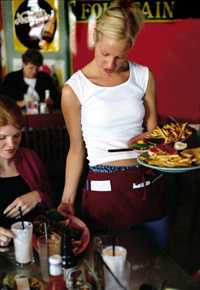Food Workers Working When They Are Sick
This page shows the study purpose, method, results, conclusions, and recommendations in plain language for the EHS-Net project titled Ill Food Worker Study.
The findings and recommendations from this project are also in fact sheet format [PDF - 273 KB].
Citations for more EHS-Net publications are available by Study Topic or by Citation.

Study Problem
Millions of people get sick every year from food. Many of these illnesses have been linked to restaurants. Food eaten at restaurants sometimes makes people sick because food workers handled the food when they were sick with vomiting or diarrhea.
Germs from sick food workers can get onto food if workers do not wash their hands properly and then touch food with their bare hands. If that food will not be cooked—for example, salads and sandwiches—customers who eat it can then get sick.
Study Purpose
This study described traits of food workers who worked when they were sick. The study also looked at traits of restaurants where workers worked when they were sick. If we know this information, it can help us prevent workers from working in restaurants when they are sick. This will help protect customers from getting sick.
Study Findings in Brief
EHS-Net found that
- 12% of food workers said they had worked when they were sick with vomiting or diarrhea.
- Food workers were less likely to say they had worked when they were sick if they worked in a restaurant that
- Was less busy.
- Had a policy for workers to tell their manager when they were sick.
- Had workers who could come to work to fill in (on-call workers).
- Had a manager with more experience.
Study Method
Participants
We collected data in 426 restaurants picked at random. These restaurants were in nine EHS-Net sites.
Data Collection
State and local environmental health specialists collected the data. In each restaurant, we talked to a manager and at least one worker. We asked the manager about the type of food served, number of workers, number of meals served, and other traits of the restaurant. We asked workers about things such as age, education, years of work experience, and about working when sick.
Study Results
12% of workers said they worked when they were sick with vomiting or diarrhea on two or more shifts during the last year.
Workers were more likely to say they had worked when sick if they worked in a restaurant that
- Served more than 300 meals a day.
- Did not have a policy that required workers to tell a manager when they are sick.
- Did not have an on-call worker.
- Had a manager with less than 4 years of experience.
Male workers were more likely to say they had worked when sick.
Several factors were not related to whether workers said they had worked while sick. These factors included restaurant type, manager and food worker training, and paid sick leave.
Study Conclusions
These findings suggest things that may lead to working when sick:
- Pressure to do so (busy restaurants, no on-call workers).
- Managers not knowing that workers are sick.
EHS-Net Recommends
More efforts are needed so fewer food workers work when they are sick. Restaurant managers and food-safety programs should consider urging restaurants to create
- Policies that require food workers to tell managers when they are sick.
- Schedules that ease the pressure for workers to work when they are sick. One example is having on-call workers for every shift.
More research is needed to better know
- Why restaurants with managers with more experience have fewer workers who work when they are sick.
- What other factors guide a worker’s choice to work when sick. Factors could include
- Workplace culture.
- Severity of symptoms.
- Need for income.
- Views and beliefs about working when sick.
- The link between paid sick leave and workers working when they are sick.
- Page last reviewed: March 23, 2017
- Page last updated: March 23, 2017
- Content source:


 ShareCompartir
ShareCompartir